-
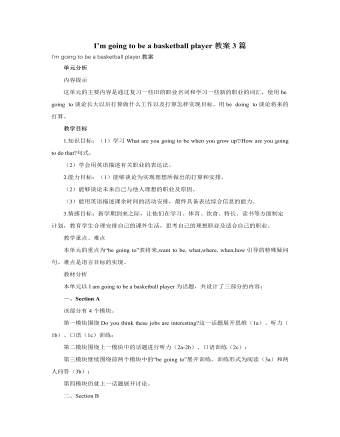
人教版新目标初中英语八年级上册I’m going to be a basketball player教案3篇
教学目标1.知识目标:(1)学习What are you going to be when you grow up?/How are you going to do that?句式。(2)学会用英语描述有关职业的表达法。2.能力目标:(1)能够谈论为实现理想所做出的打算和安排。(2)能够谈论未来自己与他人理想的职业及原因。(3)能用英语描述课余时间的活动安排,最终具备表达综合信息的能力。3.情感目标:新学期到来之际,让他们在学习、体育、饮食、特长、读书等方面制定计划,教育学生合理安排自己的课外生活,思考自己的理想职业及适合自己的职业。教学重点、难点本单元的重点为“be going to”表将来,want to be, what,where, when,how引导的特殊疑问句。难点是语言目标的实现。教材分析本单元以I am going to be a basketball player为话题,共设计了三部分的内容:一、Section A该部分有4个模块。第一模块围绕Do you think these jobs are interesting?这一话题展开思维(1a)、听力(1b)、口语(1c)训练;

人教版新目标初中英语八年级上册Can you come to my party教案3篇
Step 3 (3b)First, tell the students when we talk about our future plans, we often use: I’m+verb+ing When we talk about what we must do, we use have to. Ask the students to fill in the blanks in 3b. The answers are: shopping, go to see, a test, I’m going, my family. Step 4 (3c)Let the students write an e-mail message to a friend. Say why you can’t visit next. Before the exercise, ask the students to give some possible answers and write them on the blackboard. So the students will feel easy to finish the writing exercise. After they finish it, Let them to correct it in groups first. Each group chooses theirs best one to read in front of the whole class. Step 5 ( planning a party )First read the conversation in the box together. Then ask the students to turn to page 88.Write down everything you have to do next week. Write in all the things you have to do . Ask the students to look at the list. Ask them “What day are you free?” This is when you can have your party. Step 6 (Self check 1 )Let the students to fill in the blanks with the words given. Change the forms of the words if possible. Then make their own sentences. The answers are: visit, playing, have to, study, comeStep 7 (Self check 2)Imagine you are Marie. Read the information and look at your schedule. Write replies to the invitation.
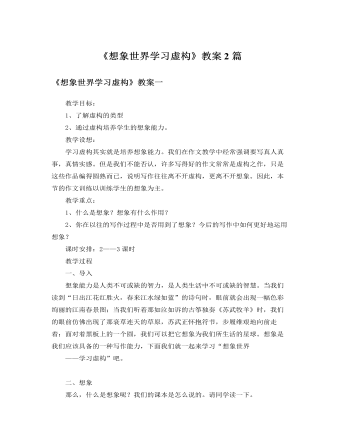
人教版高中语文必修2《想象世界学习虚构》教案2篇
虚构不等于说假话。它是一种源于生活,但高于生活的艺术真实。我们可以举个例子:我国公认的最权威最真实的史书是——《史记》,那么,大家认为《史记》里有没有虚构呢?有。必修一的《鸿门宴》里就有虚构。大家想:司马迁是哪个朝代的人?西汉汉武帝时。刘邦项羽是哪个朝代的?秦末时期。那司马迁不可能坐时光穿梭机到秦末去参加鸿门宴吧?既然他没不在场,那课文《鸿门宴》里人物的语言、动作、甚至是表情从何而来呢?对,是司马迁根据有限的史料加以补充,想象、虚构出来的。那么,同学们在写作文时,也可以不必拘泥于亲身经历的事情,毕竟生活是平淡的,毕竟大家的生活阅历也有限,有时候,我们发挥想象、虚构一个故事来反映生活的真实,也许更生动、也更典型。所以,近年来高考试卷中都提示考生:作文可以大胆想象,编写故事。按照编故事的方式不同,我们的虚构性作文又可以写哪些类型呢:小说,散文,童话,寓言,科幻,故事新编……
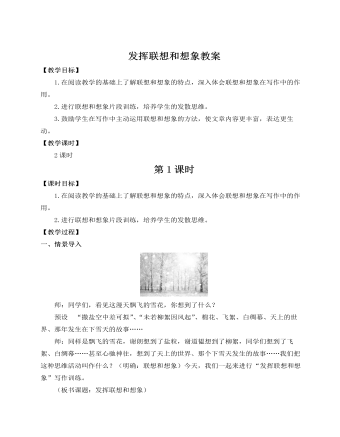
人教部编版七年级语文上册发挥联想和想象教案
【设计意图】本环节是为了突破难点而设计,以名篇佳作为范例,引导学生理解什么叫作合理而大胆的想象,示范作用明显。另外,本环节也是为下一环节——学生自由想象自己十年后的生活做铺垫。三、写作实践师:同学们,让我们拿起笔,徜徉于联想和想象的世界。1.学生写作课件出示:题目:你有没有憧憬过未来的生活?你觉得,十年以后的你是什么样子的呢?在做什么?又有着怎样的精神面貌呢?请以《十年后的我》为题,发挥想象,写一篇作文。不少于500字。思路点拨:发挥大胆而丰富的想象,可从十年后的生活变化、社会发展变化等方面着手,塑造人物的变化,如人物的相貌、心态及性格等,但性格的发展一定要符合逻辑。写法指导:选择一件事或几件事,通过语言、动作等描写来展现人物的性格。写作中也可采用前后对比的手法,如现在的“我”性格暴躁,十年后的“我”性格温顺等,通过人物的变化来反映社会的变化。
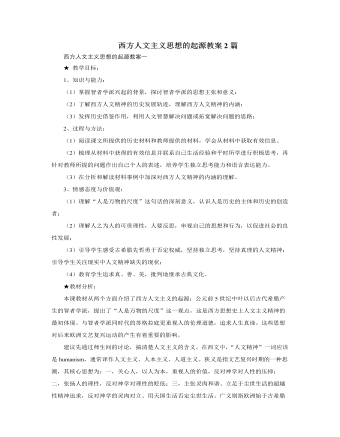
人教版高中历史必修3西方人文主义思想的起源教案2篇
在当时雅典的公民大会和陪审法庭上,人们常常要发表意见,要和自己的对手辩论,雅典法庭规定每个公民须替自己辩护,不许旁人代辩。所以出现了这样一批专门教授人辩论、演说、修辞的技巧和参政知识的职业教师。①政治因素:雅典奴隶制民主政治发展到顶峰,成为希腊政治和文化中心。参与政治生活成为每个公民生活的重要内容②古希腊工商业发展,奴隶制经济繁荣(在广大奴隶的劳动基础上,古希腊的经济迅速发展起来,为哲学的成长提供了物质条件)——根本原因③人的地位的提高(民主政治制度和每个公民参与政治意识的加强,使人的中心地位日益突出)最后教师强调:提示并强调学生学习时要注意理解“一定的文化是一定社会的政治和经济在观念形态上的反映”。3、代表人物:普罗泰格拉4、研究领域:人和人类社会关注人与人之间的关系、社会组织、风俗习惯和伦理规范
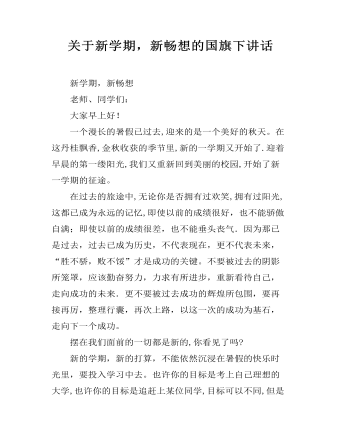
关于新学期,新畅想的国旗下讲话
新学期,新畅想老师、同学们:大家早上好!一个漫长的暑假已过去,迎来的是一个美好的秋天。在这丹桂飘香,金秋收获的季节里,新的一学期又开始了.迎着早晨的第一缕阳光,我们又重新回到美丽的校园,开始了新一学期的征途。在过去的旅途中,无论你是否拥有过欢笑,拥有过阳光,这都已成为永远的记忆,即使以前的成绩很好,也不能骄傲自满;即使以前的成绩很差,也不能垂头丧气.因为那已是过去,过去已成为历史,不代表现在,更不代表未来,“胜不骄,败不馁”才是成功的关键。不要被过去的阴影所笼罩,应该勤奋努力,力求有所进步,重新看待自己,走向成功的未来.更不要被过去成功的辉煌所包围,要再接再厉,整理行囊,再次上路,以这一次的成功为基石,走向下一个成功。摆在我们面前的一切都是新的,你看见了吗?
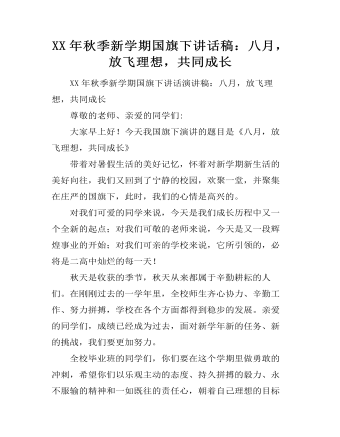
XX年秋季新学期国旗下讲话稿:八月,放飞理想,共同成长
XX年秋季新学期国旗下讲话演讲稿:八月,放飞理想,共同成长尊敬的老师、亲爱的同学们:大家早上好!今天我国旗下演讲的题目是《八月,放飞理想,共同成长》带着对暑假生活的美好记忆,怀着对新学期新生活的美好向往,我们又回到了宁静的校园,欢聚一堂,并聚集在庄严的国旗下,此时,我们的心情是高兴的。对我们可爱的同学来说,今天是我们成长历程中又一个全新的起点;对我们可敬的老师来说,今天是又一段辉煌事业的开始;对我们可亲的学校来说,它所引领的,必将是二高中灿烂的每一天!秋天是收获的季节,秋天从来都属于辛勤耕耘的人们。在刚刚过去的一学年里,全校师生齐心协力、辛勤工作、努力拼搏,学校在各个方面都得到稳步的发展。亲爱的同学们,成绩已经成为过去,面对新学年新的任务、新的挑战,我们要更加努力。
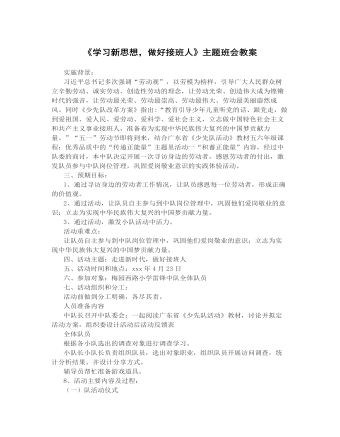
《学习新思想,做好接班人》主题班会教案
1、注重生成性,让队员成为活动的主人。这次活动,从确立活动主题,选择调查对象,设计活动过程,到写活动主持稿、准备活动道具等都是队员自主商量决定的。在活动过程中,能够发挥队员的自主性,以研究性学习,走访调查等方式开展活动,队员活动积极性较大。在小队展开走访调查时,队员们积极商量分工、设计问卷题目等活动。为了更好地采访劳动者,各个小队的队员各出奇谋,有一个小队队员们设计了网上调查问卷,发动家长、辅导员、其他人员完成问卷,然后对外卖小哥进行面谈访问,再两份调查结果进行比较分析。有一个小队的队员在采访时,注重把清洁工的工作以量化的形式去问,然后用数据来说话,他们还用录音记录采访的过程。有一个小队不仅边采访边拍照,还跟着保安叔叔进行站岗体验和学习防身拳……本次活动,除了课前采访调查和自行设计分享方式之外,其他的活动和环节都没有预设和尝试,而且每个小队的汇报的排练都是对其他小队都是保密的,因此本次活动课的内容都是现场生成的。
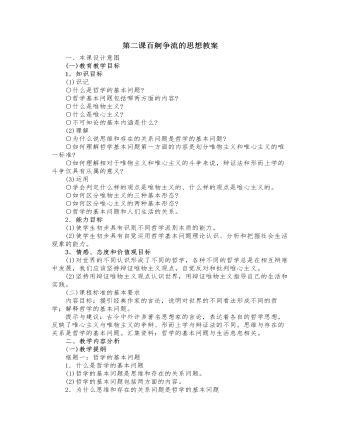
人教版高中政治必修4第二课百舸争流的思想教案
不可知论是否认人们认识世界或彻底改造世界的可能性的哲学学说。此概念首先由英国的赫胥黎(1825—1895)于1869年提出,不可知论的思想在古代就已产生,欧洲近代的主要代表是休谟和康德。其本质是把人的感觉看作是主观和客观之间的屏障而不是桥梁,不承认在感觉之外有确实可靠的客观外部世界的存在,不懂得认识过程中本质与现象、有限与无限的辩证关系。对不可知论最有力的驳斥是实践。有时不可知论一词也用以专指针对宗教教义而提出的一种学说,认为上帝是否存在、灵魂是否不朽是不可知的。2.二元论二元论是认为世界有两个本原的哲学学说,与一元论相对立,它把物质和意识绝对对立起来,认为物质和意识是两个各自独立、相互平行发展着的实体,谁也不产生谁,谁也不决定谁,都是世界的本原。它的观点是错误的:它肯定精神不依赖于物质而独立存在,这本身就是唯心主义的观点;它虽然承认物质是独立的本原,但在说明物质和精神的关系时,又把精神说成是唯一具有能动性的力量,必然倒向唯心主义。主要代表人物是法国的笛卡儿和德国的康德。
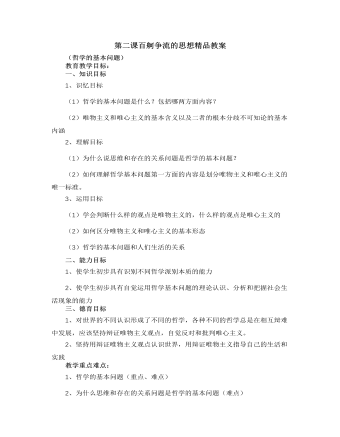
人教版高中政治必修4第二课百舸争流的思想精品教案
7、人总是按照自己对周围世界和人生的理解做事。有人认为命由天定,因而身处困境只是消极等待、逆来顺受;有人认为人定胜天,因而在困难面前积极奋争、不屈不挠。以上材料说明( )A哲学源于人们对实践的追问和对世界的思考B世界观决定方法论,方法论体现着世界观C哲学不等于自发的世界观D哲学是关于世界观的学说8、世界观和方法论的关系是()A世界观和方法论相互决定B方法论决定世界观,世界观体现方法论 C世界观决定方法论,方法论体现世界观 D世界观和方法论相互影响,相互决定9、下列关于哲学、世界观、具体知识之间联系的正确说法是()A哲学是关于世界观和具体知识的统一B哲学就是科学的世界观和具体知识C哲学是关于世界观的学说,是具体知识的概括和总结D哲学决定世界观,世界观决定具体知识10、下列对哲学的认识,不正确的是()A哲学是关于世界观的学说B哲学是世界观和方法论的统一C哲学是理论化、系统化、科学化的世界观D哲学是对具体知识的概括和总结
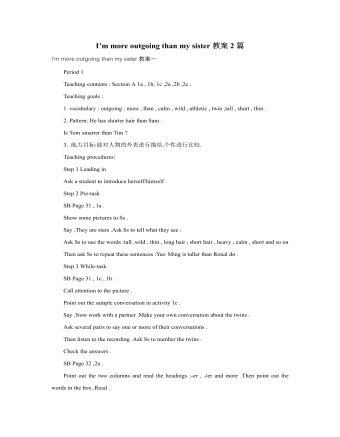
人教版新目标初中英语八年级上册I’m more outgoing than my sister教案2篇
1 交通工具的比较此活动为小组活动。学生通过讨论找出到达某一城市可乘坐的各种交通工具,并选择最佳出行方式。Teacher:We’re going to Shanghai. How many ways can we use to get there? Yes, there are four ways: by bus, by plane, by train, by ship. Please discuss how you are going to get there.操作建议:(1)学生以小组为单位展开活动,谈论本组所选择的交通工具。(2)各组选代表向全班汇报,阐述本组所选择的交通工具的利和弊。完成任务所需要的语言结构:We can go there by ship. It’s more comfortable and cheaper than any other transportation.We can go there by bus. It’s cheaper but it takes longer time.2 哪个城市更合适?此活动具有挑战性。假设中国要举行2014年世界杯足球赛,分别从历史,人文,天气等方面对各城市(北京,大连,上海,昆明)进行比较,选择最佳举办城市。T: Imagine China is holding the 2014 FIFA World Cup. Which city do you think is the best for the World Cup, Beijing, Dalian, Shanghai or Kunming? Let’s work in groups. If you choose Beijing, please join the Team Red. If you chose Dalian, please join the Team White. If you choose Shanghai, please join the Team Blue. If you choose Kunming, please join the Team Green. Please show us its advantages. Then let’s see which team will win.
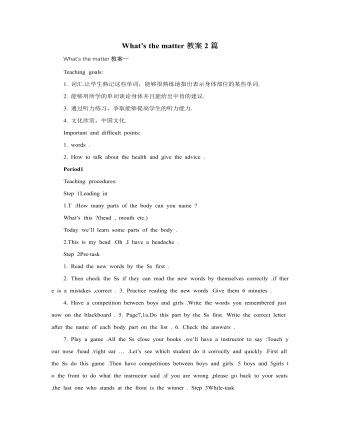
人教版新目标初中英语八年级上册What’s the matter教案2篇
She shouldn’t go to the party tonight.Step7. TaskT: You know, there are lots of problems in our life. If you are a doctor, please tell us how to solve the problem. I will divide you into 9 groups. Please work in groups. And then choose one of you to report your ideas.The following are the problems:I have a toothache.I am hungry. I have a sore throat.I am stressed out. I have a sore back.I am tired. I can’t sleep.I have a cold. I have a headache.Report: If you have a headache, you should go to bed early. You should see the doctor. You should eat some medicine. You shouldn’t wash your face with cold water.You shouldn’t sleep late.You shouldn’t swim.…..T encourages the students to give advice as much as possible.Homework:1. Chose one of the problems, and write down your advice2. Copy the new words这一步是用于热身的,同时也可以让他们复习一部分的表示人体部位的单词,扩充知识.学习语言的过程也是一个不断积累的过程,复习旧知识,增添新知识.通过小游戏,强化学生对Does she/he have…这个句子的运用能力.通过复习,自然的引到下面新知识的学习。充分利用表格,由句子到对话,再到文章,让学生循序渐进. 提高学生的综合语言运用能力,运用以前学过的知识来解决身边的问题.Period 5 (Section B 3a—3c, selfcheck)教学内容与分析:

人教版新目标初中英语九年级上册How do you study for a test教案2篇
内容提示本单元主要内容是学会利用verb十by/with gerund表示方式方法来讨论学习英语的策略,认识自己在学习方面的长处和不足。初步了解现在完成时的结构和用法。现在完成时由助动词have/has+动词的过去分词构成,主要表示过去发生的某一动作对现在仍有影响或造成的后果,常与already,yet,just,ever,never等副词连用。教学目标一、学习目标(Language Goal) 1. Talk about how to study . 学会讨论各种学习方法和策略。2. Find out your suitable learning methods. 找出适合自己的学习方法。 二、语言结构(Language Structures) 1. Verb + by with gerund by+动名词短语 表示“通过…途径,方法” 2. How questions have引导的特殊疑问句 三、目标语言(Target Language) 1. How do you study for tests ? 你是怎样准备考试的?Well , I study by working with my classmates. 哦,我和同学们一起学习。2. Have you ever studied with a group ? 你曾经参加过学习小组吗?Yes , I have . I’ve learned a lot that way . 是的,参加过。通过这种方式我学了许多。

人教版新目标初中英语九年级上册Where would you like to visit教案2篇
The First PeriodⅠ.Teaching Aims and DemandsKnowledge Objects(1) Key Vocabularytiring, educational, fascinating, thrilling, peaceful, exotic, trek, jungle, take it easy, explore, historic, site(2) Target LanguageWhere would you like to go on vacation?I’d like to trek through the jungle, because I like exciting vacations.2. Ability Objects(1)Train students to talk about places they would like to visit with the target language.(2)Train students to describe vacations with different adjectives.(3)Train students' listening skill.3. Moral Object,It′s more interesting to go on vacating somewhere instead of staying at home.Ⅱ. Teaching Key Points1. Key Vocabularytiring, educational, fascinating, thrilling, peaceful, exotic, trek, jungle, take it easy, explore, historic, site2. Target LanguageTalk about different places with the target language.Ⅲ. Teaching Difficult Points1. Describe vacations with different adjectives.2. Talk about different places with the target language.Ⅳ. Teaching Methods1. Teaching by illumination2. Teaching by doing chain drills3. Teaching by pairworkⅤ. Teaching Aids1. A tape recorder2. Some pictures of different places with famous views
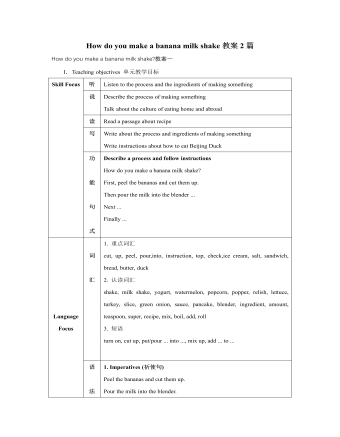
人教版新目标初中英语八年级上册How do you make a banana milk shake教案2篇
1. First, ... then, ... next, ... finally, ...首先,……然后,……接着,……最后,……这是英语中表达做某事的步骤的一种说法。如果步骤较多,还可以说:first-next-after that-later on-finally/at last通常你会听到说英语国家的人在说 first, next, then, finally 和后面的内容时,他们会做一些停顿。这样就能提前告诉听者接下来讲的是一系列的步骤。这一点在朗读和听力中应特别注意。2. how many, how much均为疑问词,同是“多少”,但用法不同。请看:how many修饰可数名词复数,how much修饰不可数名词。但在用法上,同学们常犯如下错误:1) [误] How many are there bananas on the table?[正] How many bananas are there on the table?[析] how many, how much 中的many,much是形容词,常修饰名词作定语,故后面跟名词。2) [误]How much tea are there on the table?[正]How much tea is there on the table?[析] how much修饰不可数名词时,谓语动词用单数。how many与how much的区别可简记为:前how many:问“多少”,复数名词后面跑;how much问“多少”,不可数名词单数好。前者答语用基数词,后者答语用数量关系。
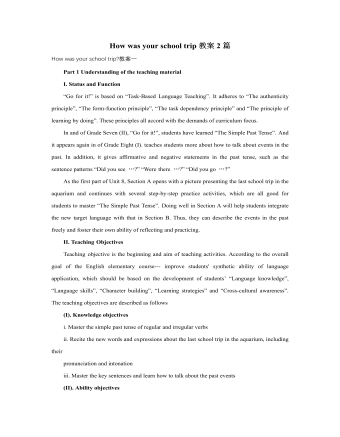
人教版新目标初中英语八年级上册How was your school trip教案2篇
“Go for it!” is based on “Task-Based Language Teaching”. It adheres to “The authenticity principle”, “The form-function principle”, “The task dependency principle” and “The principle of learning by doing”. These principles all accord with the demands of curriculum focus.In and of Grade Seven (II), “Go for it!”, students have learned “The Simple Past Tense”. And it appears again in of Grade Eight (I). teaches students more about how to talk about events in the past. In addition, it gives affirmative and negative statements in the past tense, such as the sentence patterns “Did you see …?” “Were there …?” “Did you go …?” As the first part of Unit 8, Section A opens with a picture presenting the last school trip in the aquarium and continues with several step-by-step practice activities, which are all good for students to master “The Simple Past Tense”. Doing well in Section A will help students integrate the new target language with that in Section B. Thus, they can describe the events in the past freely and foster their own ability of reflecting and practicing. II. Teaching ObjectivesTeaching objective is the beginning and aim of teaching activities. According to the overall goal of the English elementary course--- improve students' synthetic ability of language application, which should be based on the development of students’ “Language knowledge”, “Language skills”, “Character building”, “Learning strategies” and “Cross-cultural awareness”. The teaching objectives are described as follows(I). Knowledge objectivesi. Master the simple past tense of regular and irregular verbsii. Recite the new words and expressions about the last school trip in the aquarium, including their pronunciation and intonation

人教版新目标初中英语八年级上册How do you get to school教案2篇
Step Ⅶ Role play ( Work on 1b)1. First ask two students to read the dialogue to the class.Sa: How do you get to school?Sb: Well, I ride my bike to the subway station. Then I take the subway.2. Now work with a partner.Suppose you use two kinds of transportation to get to school \Hangzhou\Beijing... (bus, train, subway, walking, bike, etc.) Tell how you get there. You may use the phrases in 1a.3. Then ask different pairs of students to present their conversations to the class.Step ⅧListening1. Work on 2a(1) First ask students to read the list of information that Thomas wants to know.…where Nina lives.…how far from school she lives.…how long it takes to get to school.…how she gets to school.…what she thinks of the transportation.(2) Tell students what transportation and bus stop mean.bus stop 汽车站 transportation n. 运送;运输Then tell students we'll hear a recording. Please put a checkmark in front of each thing that Thomas wants to know.(3) Now play the recording for students.( Have students pay attention to the sample answer.) (4) Then correct the answers.

人教版新目标初中英语八年级上册What are you doing for vacation教案2篇
Teaching goals : 1. Words & phrases: babysit ,get back , fishing , rent , think about , decide(on) , tourist etc. 2. How to talk about future plans . 3. 现在进行时表示将来计划或行动. 4. 特殊疑问句(where , when , how long引导) Important and difficult points : Drills :What are you doing for vacation ? I’m watching TV . When are you going ? I’m going … . How long are you staying ? We’re staying for five days . Teaching aids : cards and a tape ,a large wall calendar . Period 1 Teaching procedures : Step 1Leading in1. Free talk . 2. Put up the wall calendar . T: I’m staying home on Saturday (pointing to next Saturday ).Ss repeat . Ss: I’m staying home on Saturday . T: OK. Today we’ll learn how to talk about future plans. Step 2Pre-task SB Page 13 , 1a . 1. Look at the picture carefully and tell what you see in the picture . 2. Write the activities from the pictures in the box and add some more . 3. Practice reading . Step 3While-task1. Using the activities we write in 1a to make conversations .For example :What are you doing for vacation ? I’m visiting my uncle . 2. Pairwork .Practice in pairs . 3. 用第三人称练习对话.
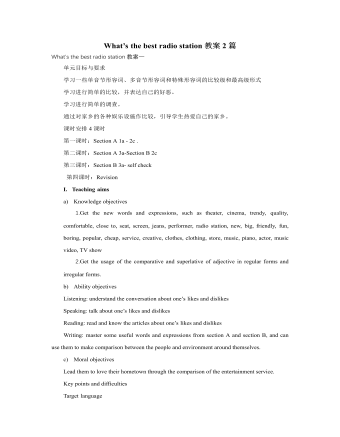
人教版新目标初中英语八年级上册What’s the best radio station教案2篇
教学重点和难点:运用所掌握的语言描述,比较不同地点的特点。在练习中学习掌握英语比较级和最高级的用法。课前准备分配小组,每组五至六人。通过上网或翻阅报刊杂志等方法,确定旅游线路,做出基本的旅游计划。教学设计:本节课流程图 学法指导:1.由于这是一堂新课,在教学中应注意面向全体,发挥学生的主体性,引导学生积极参与,激发学生的求知欲和学习积极性,指导学生积极思维,主动获取知识,养成良好的学习方法。逐步学会独立解决问题。总之要尽可能调动学生的非智力因素促进智力因素的发展。教法选择:1.电化教学法2.课堂讨论法3.任务型教学法采用这些方法的目的是为了充分调动学生的学习积极性,使学生变被动学习为主动学习。通过电脑形象的演示,加强印象,提高兴趣,突破难点,提高教学效率,进而增大教学的容量和信息量。充分体现教师为主导,学生为主体的教学原则。

人教版新目标初中英语九年级上册Teenagers should be allowed to choose their own clothes教案2篇
Step 1 Greeting Greet the class and check the homeworkStep 2 A duty report The S on duty gives a report on the rules in his home and lead in 3a “Sun Fei’s and Wu Yu’s rules” Step 3 ReadingSs read the conversation and write the two girls’ rules in the chart. Check the answers.Get Ss to read after the tape and then read aloud by themselves. Then, T explains the language points.Step 4 Pairwork 3bRole play. Use the information in chart to practice with the conversation in 3a covered. They can look at the sample conversation in the right box.Step 5 Task 2 “Who’s the best reporter?”Make a survey by asking any 5 students the questions in the chart in activity 4. Then give out a report about it. See who is the best reporter? And the best reporter will get a nice ball-pen.Step 6 Summary and homework:Write out the report in your exercise-books.Period ThreeStep 1 Greeting and a duty reportThe S gives a duty report talking about his experience of being late for school. Lead in the question “Do you ever get to school late? How often do you get to school late? Always, usually, sometimes, or never?Step 2 1a Get Ss to finish writing.Step 3 Pairwork 1b Get Ss to talk about their answers with their partners using the sample conversation in the box on the right.Step 4 Listening practice2a Lead-in: What will happen if you get to school late? What about Peter? Let’s listen to a conversation between Peter and his father. Get Ss to finish 2a (As usual, for the first time, Ss only listen.) Check the answers.


